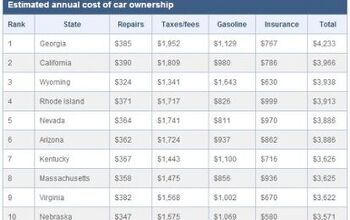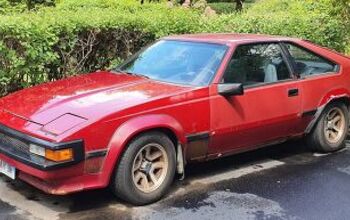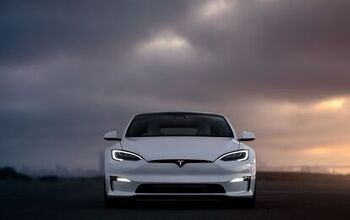QOTD: The Economics Of Ownership
$150 a week.
For some folks, this is a mere pittance. A lunch for four at a fancy restaurant that can be easily charged off to Uncle Sam and his seventeen trillion dollar debit card.
For others, it’s the beginning of a barnacle that will likely outlast their ability to pay it.
They will flex their muscles and run while they can. Then once they trip, due to a lost job or a family emergency, they will pick up an even heavier barnacle, with four wheels on it, and keep running.
It’s a vicious cycle of poverty. Where the poor always stay poor. After witnessing this cycle of automotive indebtitude for years on end, I’ve come to blame one solitary thing.
Education.
Our society encourages dependency under the guise of capitalism. Young teenagers and adults are not taught to maintain anything… other than a bank account.
We, as a society, do not promote the idea of saving money by learning how to maintain things. We do it by offering the “rah-rah” cheerleading of self-help psychology. The anointing of so-called money gurus and experts who bring out the extremes of human behavior so that we feel better about ourselves.
The marketplace is about saving money by spending it. The more expensive the good, and the higher the debt, the more economic growth we have as a civilization.
When it comes to cars, appliances and homes, we are sent from schools of higher learning to a treadmill of perpetual ignorance. We are taught to buy it; not fix it. Maintenance and upkeep is meant for the professionals. Your payments create jobs and keep these hamster wheels of human work spinning in motion. Thereby creating a stronger economy.
It’s a fraud of the nastiest of orders. The mass of humanity spends their days performing relatively mindless work to pay off debts and hoping for a small dose of personal freedom once it’s all over. To keep this cycle going, we inflate everything we can at every level.
All debts are inflated these days by third parties that essentially do nothing. Housing values are pushed up by government policies and funny money paid to banks. The two entities most responsible for the economic collapse are now given all the tools to rebuild the cycle of debt.
As for the savers? They get their savings accounts obliterated from a 3% to 5% interest level, to 0%… plus billions more in fees.
The common citizen earns it, but they don’t get to keep it. Cars are now kept under shrouds of plastic and sealed steel so that ‘lifetime fluids’ and the basic steps of maintaining a car are kept well out of reach.
The CVT will save you a couple of miles per gallon. But once it breaks, your cost is likely to outweigh the entire car because you can’t rebuild it. As for those lifetime fluids, once the warranty runs out, it’s your problem.
One of the by-products of spending over 15 years at the wholesale auctions, and developing a long-term reliability study that focuses beyond the scope of Consumer Reports and other first owner focused publications, is that I get to see firsthand what hasn’t worked in the automotive marketplace.
I get to see the Volvo XC90 with the bad transmission. The Saturn VUE with a transmission driven by a cheap belt that is now broken and financially unsalvageable. The Dodge Intrepid with the 2.7 liter engine, that not even the Salvation Army can get to run right for 10 years.
What I don’t get to see is the educated kid who isn’t taught how to maintain their vehicle. I don’t get to see the title pawns that charge their customers 25% a month interest because their customers are working 40, but keeping nothing. Even with my business which is about 50% self-financing, I don’t get the customers who are under the knife of the seven year note.
One lost job, and their equity position returns to zero. What’s worse is that they get to pay even more the next go round.
Everyone has an opinion about how to reduce consumer debt and dependency. Some believe in the free market. Others would legislate their way into a conscripted paradise. As for me, I like excavators, open containers, and easy access when it comes to cars.
As for housing, health care, education and work life, I think the answer is a bit more complicated. So let’s stick to cars for now. What would you recommend to help change the economics of ownership?
More by Steven Lang
Latest Car Reviews
Read moreLatest Product Reviews
Read moreRecent Comments
- ToolGuy If these guys opened a hotel outside Cincinnati I would go there to sleep, and to dream.
- ToolGuy Michelin's price increases mean that my relationship with them as a customer is not sustainable. 🙁
- Kwik_Shift_Pro4X I wonder if Fiat would pull off old world Italian charm full of well intentioned stereotypes.
- Chelsea I actually used to work for this guy
- SaulTigh Saw my first Cybertruck last weekend. Looked like a kit car...not an even panel to be seen.


































Comments
Join the conversation
Steve, just getting to this now but hopefully you are still reading the comments as I am curious as to your thoughts. It seem you inctie the old men here to start pining for the days everyone fixed their own stuff and point to the modern disposable attitude as the root of the problem. The thing is, the economic power of the US or any country is specialization. That means people become more interdependent and less self sufficient on their own. This is pretty much necessary to compete in the global economy. Do one job do it well. Most people don't work at that 40 hours a week any more it is 50 or 60 maybe. If you have a family what time is left for working on the car? And what use is there spending much time developing skills to work on the car? It doesn't make any sense to me. I does not bother me one but that anyone I work with can't possibly fix their own car. They have developed specialized skills that they can exchange for currency to participate in the interdependent economy by letting the expert fix their car. They can then spend more time honing their most valuable skills. To pine for the days when one fixed and serviced their own stuff...just seems like old cranks who can't deal with the fact world has moved on to me. Now for me, the currency I run short of is time. We do alright the wife and I. Just the one kid. Could have big lease payments and shiny new cars if I wanted. But we drive oldies. I have lots of experience wrenching on my own cars. But I don't always have the time. I have developed specialized skills that pay well. So I had the Toyota dealer fix some stuff on my Lexus for what the Internet says is a ridiculous sum of money. But hey I need the car to get to work and I can't get to working on it for a few weeks and then I have to burn a day either off work or not spend time with my daughter. Pretty easy choice for me. This is how I see leasing getting bigger. People just need wheels and ongoing service and get on with whatever specialized thing that they do. We need this sort of setup for used depreciated cars, what do you think? I know you do some sort of "service included" type of thing? Now I am sure there are some holes in this theory, I am I guess upper middle class so maybe my theory falls apart if one does not have a specialized enough career that affords them enough economic advantage to pay others to service their car. But I can't see the future of a competitive US economy hinge on more general skills and less specialization.
Going back to the main point in the article which is "Financial Slavery and how we have been conditioned to accept it." I really appreciate what Steve has raised in his article which is a true epidemic in our country. The educational system teaches us to be dependent on the process and it kills our creativity and resourcefulness to fix things. With that said, we know how to use the system to research a car to death before buying and we know how to use the system to get the loan and the finances but we have no clue to what it takes to keep a complex vehicle running. This is all well for the minority of the population that have a solid job and a high credit score. They can lease the Benz or the Bimmer and drive them into the ground for 60 K Miles and do no maintenance whatsoever until the oil turns to muddy sludge. Then, they turn it back in and get another one and this car ends up on the auction block. But for the majority of the population, that sits on the catcher end of this game, with iffy credit and unstable jobs and this unsatisfied "I want it now" need of the brand names like the benzes and lexuses and BMWs. These people they will end up buying someone else's problem due to lack of maintenance. They are lucky if they finance it at at 10% at a credit union but the majority can't qualify and they get herded to the "buy here pay here" lots, where they get clipped with 30% interest and a tracking device or two, installed in their cars, one under the dash and one below the speaker panel under the rear window. Now this "buy here pay here" proud customer is driving a car that needs major maintenance because it is worn out but looks good. He or she can't afford the oil change because they have to pay the man weekly 200 or so dollars. Now the car fails and the proud owner tows it to their home because they have no money to fix it. Now with no car to go to work, the job is lost. 2 payments are behind and the "buy here pay here lot" sends their favorite guy with the snatcher short wheelbase tow truck. He doesn't even pull into the driveway. He stays in the street and stretches a steel cable from his truck to the back end of the car and drags it out into the street with the tires screeching and the owner standing on his porch flabbergasted. After the car is dragged into the street, it is legal to tow it away back to the lot. At the lot they celebrate the arrival of the car since they didn't have to go to the auction to buy it and its cost has already been recovered through the original down payment and the few payments made by the proud customer that bought it. It is a free car to them to temporarily fix it and sell it again to the next ready buyer willing to be enslaved at 30% interest so the cycle of misery can repeat itself. We wouldn't be in this financial epidemic if we teach our children three basic habits; 1. Don't buy it if you don't have the cash saved up. 2. You don't need a Bimmer with 180 K Mi no matter how good it looks. 3. Open the oil fill cap. If the sludge is caked like mud, just walk.